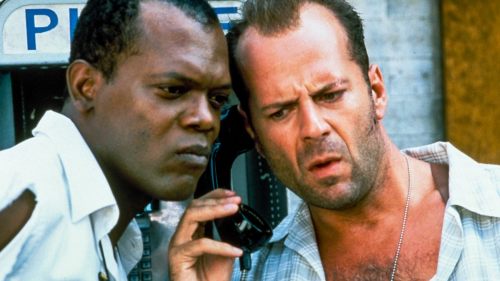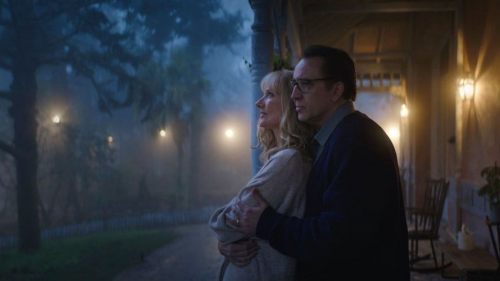A Million Miles Away: VALLEY GIRL At 35
Though Mike Nichols' The Graduate ('67) is a movie that's been analyzed to death, one of the key components to truly appreciating the picture's place in cinema history is (somewhat obviously) noting the context of the times in which it was released. By Christmas ’67, America was experiencing the eye of a cultural hurricane. There may have been no end in sight for America’s involvement in the Vietnam conflict, yet the assassinations of both Robert Kennedy and Martin Luther King, Jr. (not to mention the ensuing ‘68 riots in Chicago) were still a season away. This strange, relatively calm social period allowed a somewhat risqué romantic comedy to blithely capture the zeitgeist of those days.
Yet what's most interesting about The Graduate is the ways in which it tips its hat toward ‘60s counterculture without ever embracing it. Ben Braddock (Dustin Hoffman) may have just graduated from college, yet probably wouldn't know what to do with a joint if you rolled it in front of him. That's what makes him such a perfect protagonist to embark upon this journey of sexual discovery and dissatisfaction: he's been living in a safe, unchallenged bubble. Even his Berkley days don't see him interacting with any of the noted radicals who inhabited that campus at the time. He's a sheltered waif, untouched by these looming forces of change, and the troubadours who sung their anthems.
Martha Coolidge's Valley Girl ('83) contains a plethora of existential concerns that run parallel to The Graduate’s, yet its universe is perhaps measurably more microcosmic. Almost twenty years after Ben Braddock met Mrs. Robinson, Coolidge – working off a script from Andrew Lane and Wayne Crawford (a pair best known at the time for penning the low-rent exploitation shocker Tomcats ['77]) – picks up with a group of giggling, shopping high school sweethearts, all looking to snag the hottest outfits and score with the cutest guys. Like Braddock, viewers suspect they've hardly ventured outside of their bubble, so when that wayward wanderer's woman counterpart Julie Richman (Deborah Foreman) notices a New Wave wild man (18-year-old Nicolas Cage) across the room at a party, he becomes a portal into a realm she’d never dreamed about. He’s not just from the other side of the tracks, but another fucking galaxy.
Where The Graduate kept '60s counterculture on the periphery of its narrative, Coolidge's embracement of a budding music scene leads to the film’s exploration of identity, and what that means to these young California folks while they discover their own respective paths. Taking its title from the '82 Frank Zappa song – a hit ditty the eccentric musician wrote with his daughter Moon Unit – Coolidge's picture redefines the titular derogatory term by humanizing these young women instead of mocking them. Though they're certainly caught up in budding Reagan era consumerism, all scored by a mix of “gutless techno rock” (to quote Cage’s opinionated punk), Julie and her fellow Galleria hanging gal pals are self-analytical in their struggles with sex, love and self. In turn, Coolidge took the song's “Valspeak” – slang like “for sure”, “groady", and "bitchin" – and not only made it mainstream, but also made it sing with her performers. These aren’t archetypes, but human beings: fully fleshed and searching for their own places in the universe, just like everyone else.
Complimenting these Valley princesses is a set of hunks with their own damn issues. Though they may have been sketched by men on paper, Coolidge adds a distinct woman's gaze when admiring their bodies, while simultaneously dissecting the dudes’ often toxic attempts to "score" with Julie and the other Van Nuys dilettantes. Michael Bowen – who most modern viewers will probably know from his gruff Jackie Brown ('97) cop and Kill Bill ('03) hospital rapist – is note perfect as Tommy, Julie's blonde beau who represents the normalcy she's become totally bored by. With his popped collars and pastel Polos, Bowen becomes an avatar for the handsome preppie who would often become a villain in so many teen melodramas that emerged in Valley Girl's wake. Only Tommy is far more rounded than his appearance suggests, a festering ball of scorned masculine carnality, who doesn't know how to deal when his lady love walks off into the night with his Flock of Seagulls antithesis.
If anything, Valley Girl proves that Nicolas Cage was always a movie star; it just took the rest of us to realize it. Cage creates Randy by combining preening machismo with an outsider's "fuck you all" attitude, every note accented by his explosive stoner delivery. It's so easy to understand why Julie is attracted to him from first sight: Randy’s a goddamn unicorn, those blazing eyes and high cheekbones containing treasure chests of mystery beneath manicured blonde hair. Though Cage already had two smaller screen turns to his name – alongside Jill Schoelen and Crispin Glover in the failed teen Laugh-In, Best of Times ('81), and Amy Heckerling's Fast Times at Ridgemont High ('82) – Valley Girl was a trumpeting to the world that a new God had arrived in our midst. It's a performance for the ages: loud and sensual – the first true building block for a legendary screen career. Randy is Romeo Montague, distorted through a bank of guitar pedals and filtered through an amp stack.
Yet it wouldn't matter how good Cage is if Foreman wasn't his equal in every way, as Julie rightfully becomes the heart and soul of Valley Girl. Why Foreman didn't have a more triumphant career is somewhat baffling when you watch her work in Coolidge's movie. The young actress makes Julie sweet, sincere, yet totally sexy – a beautiful, intelligent individual on the cusp of full-blown independence, yet still looking for guidance once all of these conflicting feelings for Randy and Tommy wash over her brain. The scenes between Julie and her parents (Frederic Forrest and Colleen Camp) are a breath of fresh air after three subsequent decades of adults becoming little more than moralistic cannon operators in these sorts of teen melodramas. There's a sense of understanding that's defined within the family that’s striking and real, as Julie isn't afraid to go to her mom and dad whenever she becomes emotionally confused or overwhelmed.
While we're on the subject, Sarah and Steve Richman are two of the greatest screen parents in cinema history. Relics from their own era's counterculture – Woodstock hippie days Steve still wears busted sandals to work at the family's flailing health foods store – they simply want their daughter to grow up into a strong, wonderful woman who can think for herself. They know what it was like to ride the electric current of youth as if those days would never end, and therefore aren't setting strict rules for Julie. They just ask that she be respectful, keep them informed, and look out for herself. One of Valley Girl's absolute best moments is a brief conversation where a daughter asks her father which boy she should choose, and he merely responds, "I don't know, but let me know when you decide."
In 1981, Penelope Spheeris finished the first of her Decline of Western Civilization trilogy, profiling the LA punk scene by embedding herself with bands like X, The Germs, and Black Flag. Though the movie was merely shot and released two years later, Valley Girl feels like this document's fictional New Wave counterpart, and a distillation of a musical arena that was constantly shifting and evolving, both in sound, fashion, and fluid sexuality. While Coolidge's picture is undoubtedly something of a cash-in on this sonic movement, it also acts as a time capsule, able to put us in the car with Randy, his best bud Fred (Cameron Dye), and the girls as they cruise through Hollywood, heading for a club where the latest hip band’s playing.
This punky counterculture is reflected in Valley Girl's original soundtrack, which has become more famous than the movie itself. A murderer's row of the times' emerging artists, the Psychedelic Furs croon "Love My Way" in the background while Randy sneaks into the bathroom to meet Julie, before Modern English's "I Melt With You" scores a montage of their relationship's quick progression. Bonnie Hayes introduces the ladies with "Girls Like Me", before Josie Cotton asks "Johnnie, Are You Queer?" at the climactic prom scene (a track that stirred quite a bit of controversy with the LGBT community). There are so many fantastic needle drops, Coolidge's narrative practically becomes a jukebox musical, as we receive a history lesson on New Wave's past, thirty-five years after Valley Girl was released.
However, the greatest cue comes in Club Central, where The Plimsouls play while Randy and Julie take their first adventure away from the Valley together. Caught up in one another's eyes, the dialogue drops out and they lean in for a perfectly framed kiss as "A Million Miles Away" blares through the band's speakers. Suddenly, time ceases to exist, as all that remains is this moment, these two people, this kiss, their love. Few movies have been able to harness the power of a song quite like Valley Girl does, illustrating how one track can belong to both a moment in time and two individuals for the rest of their lives. If your heart doesn't explode in your chest as DoP Frederick Elmes' camera slowly moves in on the lovers, you may need to take up another form of entertainment. Movies simply aren't for you.
"I'm here with you now." Coolidge’s most blatant visual swipe from Nichols’ classic comes during its final moments, as she frames Randy and Julie while a limo carts them away from the prom, their positions flipped in its backseat as the after party that awaits is the rest of their lives. We don’t know if they’ll end up getting married like Julie’s parents did, but that doesn’t matter. What’s instead imprinted on our souls is that their knowing one another forever changed the course of their existences. Unlike the lingering doubt of Ben Braddock, these two teens are buoyed by the optimistic notion that they can continue exploring what their decisions mean, and how their own personalities can steer them down a road of glittery discovery, as opposed to peer pressure programming. They’re nobody but themselves, just as we all are, and can hope to be.
Valley Girl is available now on DVD from MGM (but is coming to Blu-ray this October from Shout! Factory).



